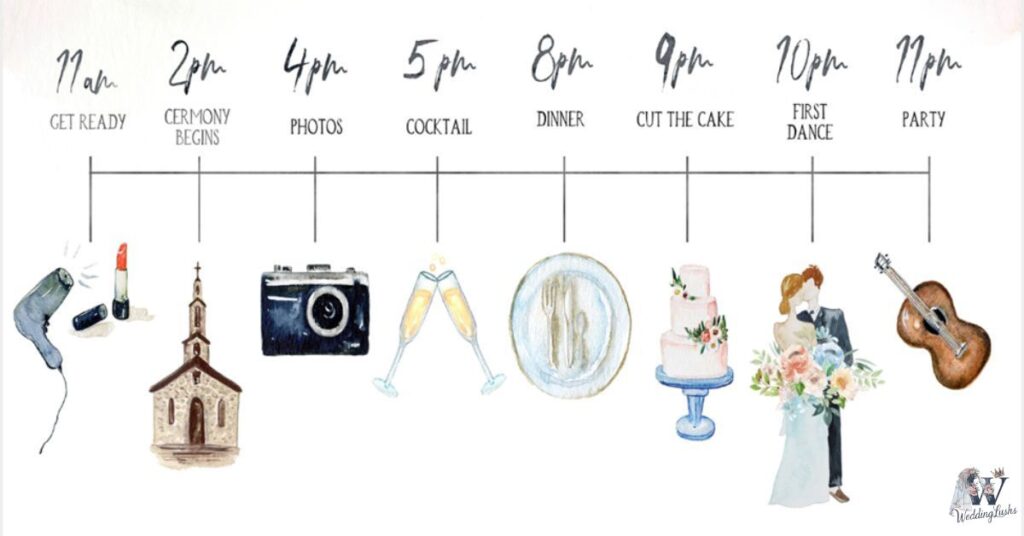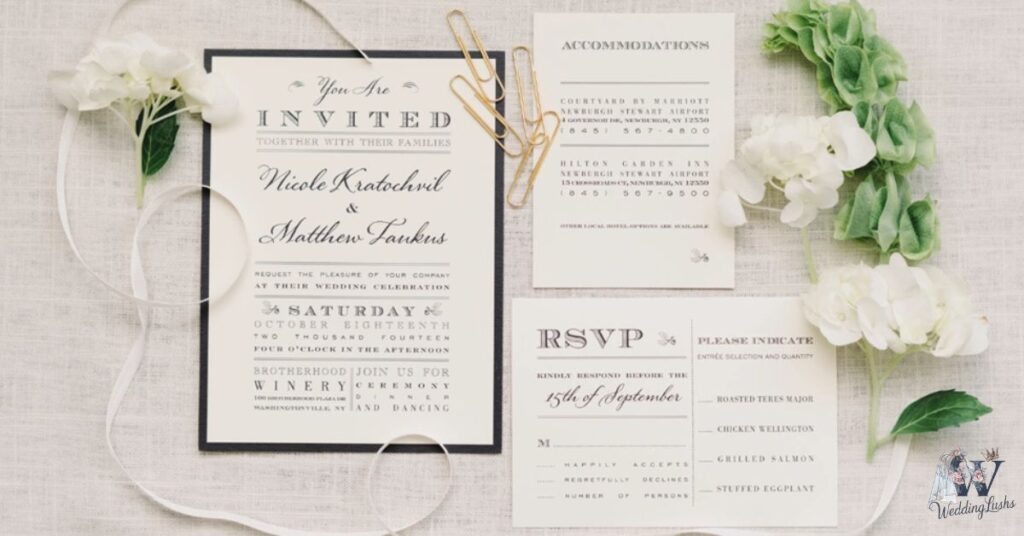Wedding invitations should be sent out three to four months before the wedding date. This timing allows guests ample time to RSVP and make arrangements.
Timing is crucial for ensuring your guests can attend and plan accordingly. Wondering when to send out your wedding invitations? Discover the perfect schedule to follow and make your wedding planning smoother.
Sending wedding invitations at the right time is crucial for a smooth event. Proper timing ensures guests can plan and respond in advance. This helps manage logistics and avoid last-minute issues. Here’s a guide on when to send invitations to keep your wedding planning on track.
When Do You Send Out Your Save The Dates?
Save the dates are best sent out six to 12 months before your wedding day. This ensures your guests have ample time to plan and adjust their schedules. Sending them early, ideally around eight months to a year in advance, helps avoid conflicts with other events. As soon as your venue and date are confirmed, there’s no reason to delay.
For couples with summer weddings, getting your date on the calendar first is crucial. This way, your guests can prioritize your wedding over other potential plans. The earlier you send them, the better chance you have of securing your guests’ attendance. Save the dates set the stage for your big day and give everyone plenty of time to prepare.
When Should You Send Wedding Invitations?
Wedding invitations should be sent out four to six months before the wedding if you haven’t sent save the dates. If save the dates were saved, invitations can be sent at least eight weeks before the wedding. The sweet spot is typically around three months before the big day. This timing allows guests to plan and respond in a timely manner.
For destination weddings, invitations should be sent about 12 weeks in advance. This gives guests plenty of time to arrange travel and accommodations. It’s essential to give extra notice to guests who need to make special travel plans. Sending invitations too late can lead to scheduling conflicts and lower attendance. Aim to send them early enough to ensure everyone can join your celebration.
Also read this: Short Wedding Nails
When Should You Send Out Save The Dates & Wedding Invitations For Destination Weddings?
For destination weddings, it’s crucial to send out save the dates as soon as your date is confirmed. This gives guests ample time to plan their trip, arrange time off, and consider extending their stay for a holiday. Aim to send save the dates at least 12 months in advance to ensure everyone has plenty of notice.
When it comes to wedding invitations, send them about 12 weeks before the wedding. This timeline allows guests to finalize their travel plans and RSVP for the various events, which may span several days. Setting up a wedding website can be helpful, offering details on activities, accommodation, and more, making the planning process smoother for everyone involved.
Ideal Timeline For Local Weddings
For local weddings, the ideal timeline for sending out invitations is four to six months before the big day. This gives guests ample time to clear their schedules and make necessary arrangements. If you’ve already sent save the dates, sending invitations around three months before the wedding is perfect.

It’s important to avoid sending invitations less than six weeks before the wedding. This can create stress for both you and your guests. For those who need extra time, such as out-of-town guests, consider sending their invitations a bit earlier. This ensures everyone has the time they need to prepare and RSVP comfortably.
Destination Weddings: Special Considerations
Destination weddings require extra planning and advanced notice for guests. Sending save the dates at least 12 months in advance is essential to give everyone time to make travel arrangements. Invitations should follow about 12 weeks before the event to confirm details and secure RSVPs.
Early Save the Dates for Destination Weddings
For destination weddings, sending save the dates early is crucial. Aim to send them at least 12 months in advance to give guests ample planning time. This early notice helps ensure higher attendance and smoother travel arrangements.
Timing Your Invitations for Maximum Attendance
Send invitations around 12 weeks before the wedding to maximize attendance. This allows guests sufficient time to finalize travel plans and adjust their schedules. For destination weddings, early notice ensures your guests can make arrangements and commit to attending.
Managing Travel and Accommodation Details
Managing travel and accommodation details is crucial for a smooth destination wedding. Provide guests with recommendations and booking information well in advance. Make sure to include this information on your wedding website or in your invitations.
The Importance of a Wedding Website
A wedding website provides guests with essential details and updates in one convenient place. It can streamline RSVP processes and offer information on travel, accommodations, and event schedules. Additionally, it allows for easy updates and communication with guests as plans evolve.
Coordinating Multi-Day Events and Activities
When planning a destination wedding, coordinate multi-day events to keep guests informed and engaged. Use a wedding website to provide detailed schedules and activity options. Ensure all guests have clear information on event timings and locations for a seamless experience.
Advanced Notice For Traveling Guests
Providing advanced notice to traveling guests is crucial for a smooth destination wedding experience. Aim to send save the dates at least 12 months in advance, allowing guests ample time to book flights and accommodations. Early notice helps them plan around the wedding and manage any travel logistics.
Once you send the invitations, include detailed information about the event schedule and any planned activities. This will help guests prepare for their trip and make the most of their time at your wedding. The more information you provide, the easier it will be for them to finalize their plans and enjoy the celebration.
What Is The Point Of Save The Dates?
Save the dates serve to alert your guests about your wedding well in advance, ensuring they reserve the date on their calendars. This early notice is especially important during busy wedding seasons, helping to prevent scheduling conflicts with other events. By sending save the dates, you give your guests ample time to plan and adjust their schedules accordingly.
While some might view save the dates as an added expense, they play a crucial role in wedding planning. They set the tone for your wedding and provide a preliminary glimpse into what guests can expect. Whether sent digitally or through traditional mail, save the dates are a valuable tool for securing your guests’ attendance and ensuring a smooth planning process.
Who Do You Send Save The Dates To?
Send save the dates to guests invited to the entire wedding day, not just the evening reception. This ensures clarity and prevents any confusion about the extent of their invitation. Evening-only guests should receive a separate invitation closer to the date.
Full-Day Guests vs. Evening-Only Attendees
Save the dates should be sent to guests invited to the full wedding day, including both the ceremony and reception. Evening-only attendees should not receive save the dates to avoid misunderstandings. Instead, they should get a separate invitation closer to the event.
Clarifying Invitation Scope
Clarifying the invitation scope ensures guests understand whether they are invited to the entire wedding or just specific parts. Clearly state on the save the date or invitation what events they are expected to attend. This avoids confusion and helps guests plan accordingly.
Avoiding Confusion with Save the Dates
To avoid confusion with save the dates, only send them to guests invited for the entire wedding day. Clearly communicate the scope of the invitation to prevent misunderstandings. Evening-only guests should receive separate, more specific invitations closer to the event.
Separate Invitations for Evening Guests
Evening guests should receive a separate invitation to clearly outline their specific event details. This avoids any confusion about their role in the wedding day. Sending these invitations closer to the wedding date ensures timely communication.
Ensuring Accurate Guest Lists
To ensure accurate guest lists, confirm who is invited to each part of the wedding before sending save the dates. Double-check that all details are correct to avoid any mix-ups. Regularly update your guest list to reflect any changes or additions.
Should You Send Save The Dates To Evening Guests?
It’s not advisable to send save the dates to guests who are only invited to the evening portion of your wedding. Save the dates are intended for those attending the entire day’s events, providing them with advance notice to mark their calendars. Sending them to evening-only guests might lead to confusion about what parts of the wedding they’re actually invited to.
Instead, send a separate invitation to evening guests closer to the wedding date. This approach clarifies their specific role and avoids any misunderstandings. Clear communication ensures that all guests know exactly what to expect and helps streamline the planning process for both you and your guests.
Importance Of RSVP Deadlines
RSVP deadlines are crucial for effective wedding planning and ensuring a smooth event. Setting a clear deadline helps you finalize your guest count, which is essential for arranging seating, catering, and other logistics. By receiving timely responses, you can make informed decisions and avoid last-minute adjustments.
Enforcing RSVP deadlines also respects the time of your vendors and helps manage costs. Late responses can disrupt seating plans and create unnecessary stress. Clear communication about the RSVP deadline ensures that all guests are aware of the importance of their timely reply, contributing to a well-organized and enjoyable wedding.
Special Considerations For Outdoor Or Seasonal Weddings
For outdoor or seasonal weddings, consider weather conditions when setting your RSVP deadline to allow for appropriate planning. Ensure your invitations and save the dates reflect any specific requirements or attire suitable for the season. Communicate any backup plans or contingencies clearly to your guests.

- Weather Planning: Prepare for potential weather conditions and communicate any backup plans to guests.
- Seasonal Attire: Indicate appropriate dress codes or attire based on the season in your invitations.
- Timing Adjustments: Send invitations earlier to account for potential weather-related delays or preparations.
- Venue Accessibility: Ensure the venue is accessible and comfortable for seasonal conditions, such as heat or cold.
- Contingency Plans: Clearly outline any contingency plans for adverse weather, such as alternative indoor locations.
Do I Have To Send My Wedding Invitations By Post?
While traditional etiquette suggests sending wedding invitations by post, many couples are opting for digital invitations as a more eco-friendly and convenient option. Digital invites can be sent via email or specialized platforms, allowing for quick delivery and easy tracking of RSVPs. They also reduce costs associated with printing and postage.

However, sending physical invitations is still a common practice, especially for formal events. Printed invitations offer a tangible keepsake and can set a sophisticated tone for your wedding. Ultimately, the choice between digital and paper invitations depends on your preferences, budget, and the formality of your event.
How Far In Advance Should Invitations Be Mailed?
Invitations should generally be mailed three to four months before the wedding date. This timeline allows guests enough time to make travel arrangements, adjust their schedules, and respond to your RSVP request. If you have already sent save the dates, this timeline ensures that guests receive a detailed invitation with all the necessary information.

For destination weddings or larger events, consider mailing invitations even earlier, around four to six months in advance. This additional time helps guests with travel logistics and accommodation planning. Ensuring that invitations are sent with adequate notice helps in managing guest lists and planning effectively for the big day.
Sending Invitations For Weekday Weddings
Sending invitations for weekday weddings requires extra consideration due to guests’ work and personal commitments. Aim to mail invitations at least four to six months in advance to give guests ample time to arrange time off and adjust their schedules. This extended notice helps minimize conflicts with work or other obligations.
Additionally, be clear in your invitations about the weekday timing and any potential impact on guests’ plans. Highlight the importance of their presence and provide any relevant details to make attending easier. Adequate notice and clear communication will help ensure that your weekday wedding is well-attended and smoothly executed.
How To Handle Last-Minute Guest List Changes
Handling last-minute guest list changes requires a flexible approach and clear communication. Start by updating your seating chart and other arrangements as soon as changes are confirmed to avoid confusion on the day of the event. Notify your venue and vendors of any adjustments to ensure they can accommodate the revised guest count.
Informing affected guests quickly and efficiently is also important. Reach out via phone or email to update them on any changes and provide any necessary details. Staying organized and maintaining open lines of communication will help manage these changes smoothly and minimize any potential disruptions.
Sending Invitations With A Tight Timeline
When dealing with a tight timeline for sending invitations, prioritize getting them out as quickly as possible to allow guests time to respond. Aim to send them as soon as you finalize key details, even if it means shortening the usual notice period. Make sure to include all necessary information clearly and concisely to avoid confusion.
For guests who may need additional time, such as those traveling from afar, consider following up with a reminder closer to the event. Efficient communication helps manage expectations and ensures that all guests are informed despite the time constraints. Planning ahead and being organized can help mitigate the stress of a tight timeline.
Final Words
Navigating the timeline for sending wedding invitations requires careful planning and consideration to ensure a smooth and organized event. By adhering to suggested timeframes—sending save the dates 6 to 12 months in advance and formal invitations 3 to 4 months before the wedding—you provide your guests with ample time to adjust their schedules and make necessary arrangements. This proactive approach helps prevent last-minute stress and ensures that your guests can attend and enjoy your special day.
For destination weddings or events with a tight timeline, advance planning becomes even more crucial. Sending invitations earlier, with clear and detailed information, allows guests to manage travel and accommodation arrangements effectively. Whether opting for traditional paper invites or digital alternatives, clear communication and timely distribution of invitations are key to ensuring a successful and well-attended celebration.
Frequently Asked Questions
How far in advance should I send wedding invites?
Send wedding invitations three to four months before the big day. For destination weddings or larger events, consider mailing them four to six months in advance. This timing allows guests enough time to plan and RSVP.
Is it rude to send a save the date and not an invitation?
Yes, sending a save the date without a subsequent invitation can be considered rude. It may lead to confusion and false expectations about the level of the invitation. Always follow up save the dates with formal invitations to ensure clarity.
Is 3 months too early to send out wedding invitations?
No, three months is not too early to send out wedding invitations; in fact, it’s ideal. It allows guests ample time to RSVP and make any necessary arrangements. For destination weddings or large events, consider sending them even earlier.
Why not send wedding invitations early?
Sending wedding invitations too early can lead to potential changes in guest availability or wedding details. It may also result in confusion if details need to be updated or if guests forget the date. Timely invitations balance early notice with accurate information.
What is the time format for wedding invitations?
The time format for wedding invitations should use a clear and formal style, typically written in full. For example, instead of 3:00 PM, write three o’clock in the afternoon. This ensures clarity and maintains the formal tone of the invitation.
